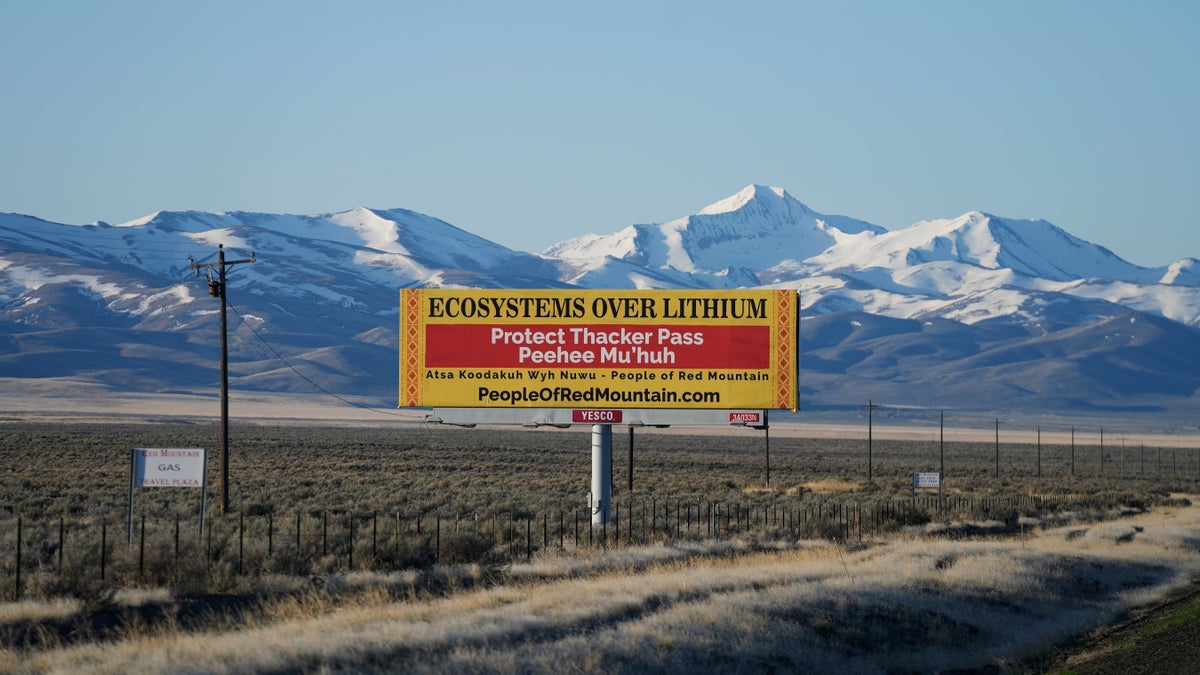
The latest bid by conservationists and tribal leaders to block construction of a huge lithium mine already in the works along the Nevada-Oregon line was denied by the 9th U.S. Circuit Court of Appeals on Monday.
A three-panel judge of the San Francisco-based appellate court rejected a half-dozen arguments the opponents had put forth in their appeal seeking to overturn federal land managers' approval of the project.
That included claims it violates multiple environmental laws and would destroy lands tribal members consider sacred because they say dozens of their ancestors were massacred there in 1865.
Lithium Nevada Corp.'s mine at Thacker Pass near the Oregon line, 200 miles (320 kilometers) northeast of Reno, has pitted environmentalists and Native Americans against President Joe Biden’s plans to combat climate change. The mine would involve extraction of the silvery-white metal used in electric vehicle batteries.
On Monday, the judges didn't specifically address the claims that the project fails to comply with a new opinion the 9th Circuit issued last year that blocked a copper mine in Arizona based on a more stringent interpretation of the 1872 Mining Law regarding the use of neighboring lands to dispose of waste.
Rather, they more generally differed to the expertise of the U.S. Bureau of Land Management, which approved the mine in 2021, and the decision by U.S. District Judge Miranda Du earlier this year to allow construction to go forward even though she concluded the mine was not in complete compliance with the new interpretation of the Civil War-era mining law.
The bureau's approval of the mine “was not arbitrary, capricious, an abuse of discretion or otherwise not in accordance with” the National Environmental Policy Act, the 11-page ruling said.
The bureau approved the mine in 2021 on an accelerated basis under Donald Trump's administration. The Biden administration has continued to embrace it in an effort to ramp up U.S. production of lithium needed for electric vehicles that are an integral part of his clean energy agenda.
Lithium Nevada officials say the Thacker Pass mine’s reserves would support lithium for more than 1.5 million electric vehicles per year for 40 years.
Conservationists say the open pit mine, deeper than the length of a football field, will pollute the groundwater and destroy precious habitat for sage grouse, pronghorn antelope and other species in violation of environmental laws.
Their lawyers had argued that Du illegally exceeded her authority when she refused to revoke the mine's operation plan in March despite her conclusion that federal land managers had violated the law in approving parts of it.
“This is the first time in public land history that we have a major project violating a number of provisions but is allowed to go forward,” Roger Flynn, the director of the Colorado-based Western Mining Action Project, told the 9th Circuit panel during oral arguments in Pasadena on June 27.
“In the meantime, thousands of acres of public land are essentially being clear-cut,” he said Tuesday about the high-desert sagebrush that serves as critical habitat for the imperiled bird species sage grouse.
The 9th Circuit ruling Monday said Du applied the proper legal standard and found the bureau's sole error in approving the project “weighed against” vacating the entire approval of the mine partly because “there was at least a serious possibility that the (agency would) be able to substantiate its decision on remand.”
Lithium Nevada, a subsidiary of the Canadian-based Lithium Americas, spent more than $8.7 million on the environmental analysis and permitting process, even altering the original plans to move it outside of environmentally sensitive areas, said Laura Granier, a lawyer for the company. She said investments in mitigation, legal costs and initial construction already have exceeded $150 million.
Government lawyers said much of the evidence the Western Shoshone and Paiute tribes presented about the sacred nature of the land came after a formal decision had been issued and that none of it clearly established the actual location of the massacre.
The 9th Circuit ruled Monday that bureau acted “reasonably and in good faith” in its consultation with tribes potentially affected by the mine.







